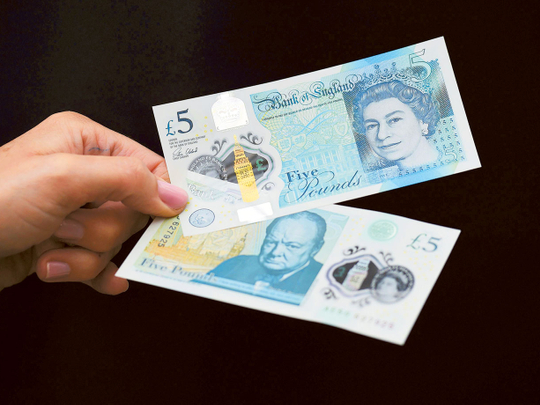
London: After more than 24 hours of conflicting polls, spiking currency volatility and suspected fat fingers, the pound is back above where it ended last week.
With just 16 days before the UK votes on whether to remain in the European Union, expectations for swings in sterling over the coming month climbed to a fresh seven-year high. The pound jumped more than 1 per cent against the dollar in about one minute on Tuesday just after 2pm in Tokyo, with a trader speculating that a mistyped transaction had triggered automatic orders to sell or buy currencies to avoid losses.
The previous day the pound was pushed as much as 1.1 per cent lower after polls signalled a lead for voters who support leaving the 28-nation bloc in the June 23 referendum.
“Taking a stance on what is going to happen on June 23 and sticking with it between now and then is just not a way you can trade sterling,” said Adam Cole, head of global foreign-exchange strategy at Royal Bank of Canada in London. “The way we are treating it is much more tactically on the information flow and not trying to cling on to a view for any length of time.”
The pound climbed 1.1 per cent to $1.4595 as of 10.13am in London, and earlier touched $1.4660, its highest level this month. The short-lived 1.5 per cent gain was its biggest intraday advance since March 17.
“Could be stops going off in thin liquidity,” Joseph Capurso, a senior currency strategist in Sydney at Commonwealth Bank of Australia, said by instant message. “Can’t imagine GBP is liquid in Asian trading hours.”
Brexit risk
Sterling’s climb comes after it dropped in early trading Monday, as three polls were released showing more Britons favour quitting the EU than staying. Two more surveys that came later the same day showed slim leads for the ‘Remain” camp.
“If I had a bias at the moment it would probably still be negative on sterling but i think most of that work has been done,” RBC’s Cole said. “If the information and news flow changes in the next few days, I can turn bullish. I just don’t think you can trade the currency strategically when you have a single big binary event like that.”
As Brexit risks become more imminent, traders and market operators around the world are preparing for the decision. Margin requirements are getting raised, bank traders will be working overnight in London, and investors from Thailand to Boston are waking up to how their positions may be affected if Britons choose to leave the trading bloc they’ve been in since 1973.
The pound has been a gauge of sentiment throughout the referendum debate. It slid to a seven-year low of $1.3836 in February, and remains the worst performing developed-market currency this year.
“We expect ‘Remain,’ but the issue is the polls are really, really close,” David Owen, chief European economist at Jefferies International Ltd, said in an interview with Anna Edwards and Manus Cranny on Bloomberg Television. “This makes it really difficult for markets that want certainty. We have to be fairly cautious going into the 23rd.”












